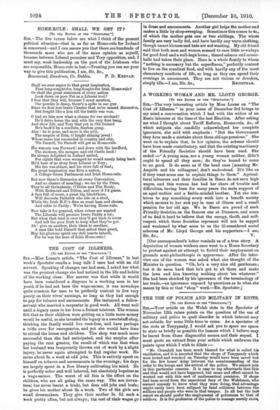THE COST OF IDLENESS.
[To THE EDITOR OP THE "SPECTATOR."' Loane's article, "The Cost of Idleness," in last week's Spectator recalls a long talk I once had with an old servant. Speaking of changes one had seen, I asked her what was the greatest change she had noticed in the life and habits of the working class. Her answer was that while it would have been considered a disgrace to a working man in her youth if he had not been the wage-earner, it was nowadays quite common for men to be perfectly content to live very poorly on their wives' earnings, so long as they had enough to pay for tobacco and amusements. She instanced a fellow- servant who married a carpenter in good work. All went well until a legacy came to her from a former mistress. The woman felt that as their children were getting on a little more money would be useful, so she invested the legacy in a sweetstuff-shop, thinking the family would live rent-free, and have perhaps a trifle over for emergencies, and yet she would have time to attend the house and children. The shop was much more successful than she had anticipated, and the surplus after paying the rent greater, the result of which was that when her husband was temporarily thrown out of work by a slight injury, he never again attempted to find regular work. He earns about 3s. a week at odd jobs. This is entirely spent on himself on tobacco and amusements in the evenings ; his days are largely spent in a free library cultivating his mind. He is perfectly sober and well behaved, but absolutely hopeless as a wage-earner. The worst of all this is the effect on the children, who are all going the same way. The son (seven- teen) has never learnt a trade, but does odd jobs and loafs ; he gives his mother about 2s. a week. Two of the girls are small dressmakers. They give their mother 3s. 6d. each a 'week pretty often, but not always ; the rest of their wages go in dress and amusements. Another girl helps the mother and makes a little by shop-sweeping. Sometimes this comes to 4s., of which the mother gets one or two shillings. The whole family are very badly fed, and have hardly any warm clothing, though smart blouses and hats are not wanting. My old friend said that both men and women seemed to care little nowadays for good food and a well-kept home ; tinned salmon and music- halls had taken their place. Here is a. whole family to whom "nothing is necessary but the superfluous," perfectly content to live on the scantiest food, and with hardly any of the most elementary comforts of life, so long as they can spend their evenings in amusement. They are not vicious or drunken,


























































 Previous page
Previous page